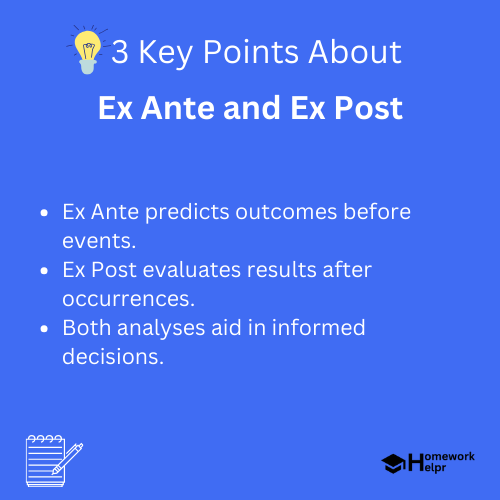📝 Summary
In decision-making, particularly in economics and social sciences, Ex Ante and Ex Post are essential concepts. Ex Ante means “before the event” and refers to evaluations made prior to decisions, aiding in risk mitigation and informed choices. For instance, market research before a product launch is an example of Ex Ante. In contrast, Ex Post means “after the event,” involving analyses conducted post-event to understand outcomes and learn from them. Both approaches complement each other, enhancing decision-making and fostering better strategies across various fields.
Understanding Ex Ante and Ex Post: A Comprehensive Guide
In the world of decision-making, particularly in economics and social sciences, the terms Ex Ante and Ex Post are frequently used. These Latin phrases provide unique perspectives on analyzing situations and decisions before and after they occur. Understanding their meanings and applications can greatly benefit students and professionals alike.
What is Ex Ante?
The term Ex Ante is derived from Latin, meaning “before the event.” It refers to assessments, evaluations, or forecasts made prior to an event or decision. This perspective aims to predict outcomes based on available data, analysis, and judgment.
For example, before launching a new product, a company may conduct market research to estimate its demand. This research is considered Ex Ante as it takes place before the product’s actual release. Similarly, in finance, investors often perform Ex Ante analysis, predicting potential returns based on current information and market trends.

Applications of Ex Ante
Ex Ante evaluations play a crucial role in various fields. Some applications include:
- Economic Policy: Governments assess the potential impact of policies before implementation.
- Investment Decisions: Investors analyze risks and returns before investing in assets.
- Project Management: Managers estimate resources and timelines before starting a project.
These examples illustrate how Ex Ante considerations can help stakeholders make informed decisions. By anticipating possible outcomes, individuals and organizations can mitigate risks and enhance their chances of success.
Definition
Economic Policy: A course of action that the government takes in managing its economic goals. Investment Decisions: The choices made by individuals or organizations regarding the allocation of resources into various assets.
What is Ex Post?
In contrast to Ex Ante, Ex Post means “after the event” in Latin. This term refers to evaluations, analyses, or assessments made after the occurrence of an event or decision. The Ex Post perspective focuses on understanding outcomes and identifying patterns or consequences once the results are known.
For instance, after a marketing campaign has been completed, a company conducts a review of its effectiveness. This analysis, which assesses the actual performance against expected outcomes, is an Ex Post evaluation. Similarly, in economics, analysts review data after a fiscal policy has been implemented to determine its impact.
Applications of Ex Post
Ex Post evaluations are essential for learning from past decisions and devising strategies for future actions. Key applications include:
- Performance Assessment: Organizations analyze projects or investments after completion to evaluate success and learn from failures.
- Policy Evaluation: Governments assess the impact of implemented policies to determine efficacy and areas needing improvement.
- Scientific Research: Researchers conduct analysis after experiments to validate hypotheses and draw conclusions.
Through Ex Post evaluations, stakeholders can identify successful strategies, recognize areas for improvement, and make data-driven decisions moving forward. This process is essential for continuous growth and development.
Definition
Performance Assessment: The evaluation of how well a task or project has been completed, often against predefined criteria. Policy Evaluation: The systematic assessment of the effects and effectiveness of policies implemented by governments or organizations.
❓Did You Know?
Did you know that both Ex Ante and Ex Post analyses are essential in predicting economic recessions? By understanding potential outcomes and examining past events, economists can develop stronger models for forecasting.
Comparing Ex Ante and Ex Post
While both Ex Ante and Ex Post analyses are crucial, they serve different purposes within decision-making processes. Here are some distinct differences between the two:
- Focus: Ex Ante focuses on predictions before an event, while Ex Post reviews results after it.
- Timeframe: Ex Ante operates within a speculative timeframe, whereas Ex Post is based on factual data.
- Purpose: Ex Ante aims to prevent losses through informed decisions, while Ex Post aims to improve future decision-making through lessons learned.
This comparison elucidates how both analyses complement each other, providing a comprehensive framework for understanding decision-making dynamics.
Examples
For instance, an investor may use Ex Ante analysis to assess the potential success of a tech startup based on current market conditions. Once the startup has been operational for a year, the investor would perform an Ex Post analysis to evaluate the actual financial performance versus their initial predictions.
Conclusion
In conclusion, the concepts of Ex Ante and Ex Post analyses are vital for effective decision-making across various fields. Understanding these terms empowers individuals to make informed judgments and assess outcomes critically.
By incorporating both perspectives, one can balance predictions and evaluations, leading to more successful strategies and better results. As students and professionals continue to learn and grow, familiarity with these terms will enhance their evaluative skills and foster a more profound understanding of decision-making processes.
Related Questions on Ex Ante and Ex Post
What does Ex Ante mean?
Answer: It refers to assessments made before events
What is the purpose of Ex Post evaluations?
Answer: To learn from past decisions and improve
Where is Ex Ante analysis commonly applied?
Answer: In economic policy and investment decisions
How do Ex Ante and Ex Post complement each other?
Answer: They provide insights for better decision-making.
